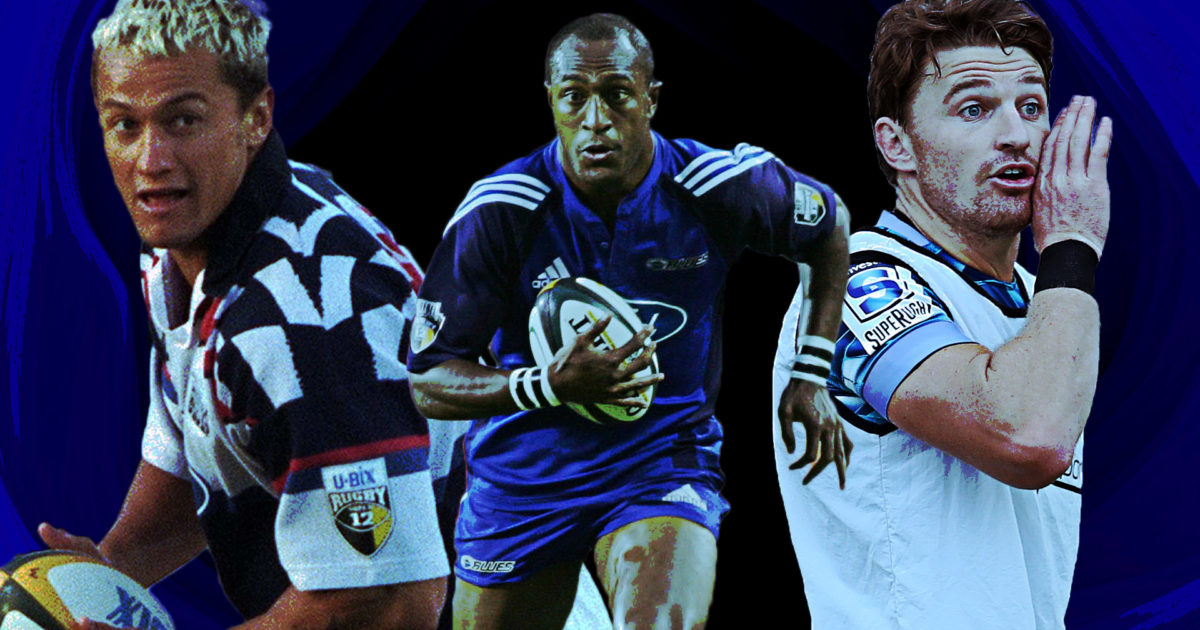Ask a Blues supporter to picture the once-mighty team’s heydays and they’ll cast their mind back to the likes of Joe Rokocoko, Carlos Spencer, Doug Howlett and Rupeni Caucaunibuca carving up opposition defences seemingly at will.
From the Super 12’s inception in 1996 until the mid-2000s, there simply wasn’t a more exciting team to support than the Blues. Their outrageously talented backs put many a side to the sword and the Auckland-based franchise has never really come close to glory since the Blues’ last title win in 2003.
Joe Rokocoko, the man who scored 25 tries in his first 20 tests for the All Blacks, was a key part of the Blues team that last tasted Super Rugby victory – though with the likes of Howlett, Caucaunibuca, Rico Gear and Mils Muliaina all on the books, the inaugural Super 12 champions were never short of talent in the outside backs.
“World-class, all those players,” Rokocoko said to RugbyPass when thinking back to the ludicrously stacked side he represented in the first half of his career.
“I remember being in the Blues the first few years. The philosophy was just ‘the wingers get the ball’ – that was Los’ (Carlos Spencer) first thing.”
Playing with the man known as King Carlos ensured every player on the field – on both teams – had to always remain on guard because you could never predict what was coming next.
“It was do-or-die every week,” recalled Rokocoko.
“Los was always a guy that said, ‘Just give me options, inside or outside.’ Then he’d just choose – so if he’s not passing an inside ball or doing a no-look pass, he’d do a banana kick.
“You can just hear the old ‘cuz, cuz, hey cuz?’ and he’d raise his eyebrows, he’d do the old look and you’d know something was coming. He’d just tell you to be ready.
“He’d create so many options for the boys. Even if you were on your own goal line or whatever, you’d know he was going to try something, you just have to be aware. His belief and trust in his backline and his team is massive. He’d back anyone.”
Rokocoko debuted for the Blues in 2003 as a 21-year-old with zero professional rugby experience. He’d missed out on representing Auckland in the 2002 NPC after breaking an ankle at the Under-21 World Cup held earlier in the year but his prodigious talent and finishing prowess was so evident that Graham Henry – the then-coach of the Blues – brought him straight into the squad.
“Making the Blues itself was a huge, huge honour,” Rokocoko said.
“I was doing rehab when Ted (Henry) came downstairs into the gym and was doing exercise. I was a bit nervous and just doing my stuff and he said, ‘How are you kid?’ and I said, ‘Oh yeah, good sir’.
"I was always having words to Jack… I was saying to him, 'Are you ready to move to 12 for me?' And then it eventually turned to, 'Please move to 12 for me.'"
Braydon Ennor spoke to @TomVinicombe about life with @CrusadersRugby. #SuperRugbyAotearoa https://t.co/IE9Z7qRX2V
— RugbyPass (@RugbyPass) May 26, 2020
“He just stands there and you can see him thinking and he goes, ‘Do you reckon you could play Super Rugby?’ and I go, ‘Nah – maybe in two, three years? But I don’t think so, not yet.’ He just goes, ‘Ok’ – that’s the only thing he said, then walked out.
“A few months later, I got a call from Fitzy (Sean Fitzpatrick) – he was the manager. He said, ‘Congratulations, you’ve made the Blues’. It was massive.”
Since Rokocoko’s debut season – which culminated in his maverick side beating the Crusaders to earn their third title – the Blues have managed just two more appearances in the knockout stages of Super Rugby.
The Blues haven’t finished higher than 9th place since 2011, which is an incredible fall from grace for the franchise that won the first two Super 12 competitions on the trot and has comfortably the largest selection-base to pick from in New Zealand.
Things were looking up for the Auckland side this year prior to Super Rugby’s cancellation with the team recording four victories in a row – including a first win away from home against a fellow New Zealand side since 2013.
Last year, the Blues also managed to break a 15-game losing streak against the Chiefs – so things are certainly looking up for the once-feared side.
https://www.instagram.com/p/CAwC7j0gxgE/
Rokocoko suspects that the arrival of one Beauden Barrett could also have a positive impact on his old team.
“He doesn’t doesn’t look too bad in Blue, he looks pretty settled in that Blues jersey,” Rokocoko said of the 83-cap All Blacks playmaker.
“I just saw his bronco, he just passed my record by two minutes I guess. It’s unbelievable how fit Beauden is, coming into it – he’ll be massive for the franchise, jut the excitement he can bring to that backline. A similar version of excitement that you bring with Los but unique – he’ll be massive.
“I’m a big fan of him and he should go good.”
The Blues have never really found a replacement for Spencer since he departed NZ’s shores in 2005 and fans and pundits alike have been quick to suggest that Barrett could be the leader that the side needs in the 10 jersey to guide the team to another Super Rugby title.
With Super Rugby Aotearoa now replacing the regular 2020 season, Barrett will be put through the ringer for his new club, with the Blues playing the four other New Zealand teams twice over a 10-week period.
Based on how things were progressing for the side prior to the suspension in March, there will be an incredible amount of confidence in the Blues camp – which might finally allow the franchise to secure their first title in 17 years.










































































